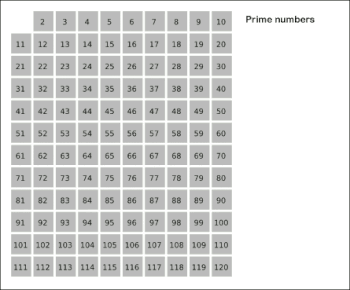[Lc]204计数质数
Contents
题目

题解
1. 暴力法
直接用暴力法会超时,时间复杂度$O(n^{2})$,因此使用暴力法要进行优化,即isPrime()函数只用遍历到sqrt(N),因为:
$$
2 × 6 = 12\\
3 × 4 = 12\\
sqrt(12) × sqrt(12) = 12\\
4 × 3 = 12\\
6 × 2 = 12\\
$$
可以看出从sqrt(12)开始上下的对称的,那么sqrt(12)上面若没找到因数,则下面也没有
- 时间复杂度$O(sqrt(n)*n)$
- 空间复杂度$O(1)$
class Solution {
public:
//0和1不是质数
bool isPrime(int n){
for(int i=2; i*i<=n;++i){//注意只要搜索到sqrt(n)就可以,因为在sqrt(n)前后是对称的,见提示3
if(n%i==0) return false;
}
return true;
}
int countPrimes(int n) {//两个方法。1暴力法
int res = 0;
for(int i=2; i<n; ++i){
if(isPrime(i)) res++;
}
return res;
}
};
2. 埃拉托斯特尼筛法
用一个vector存小于n的所有数是否为质数,然后挨个筛,从2开始,2的倍数全为合数,筛掉,然后3的倍数,遇到合数就不求倍数,具体看这个图:
- 时间复杂度$O(nlog{log{n}})$
- 空间复杂度$O(n)$
class Solution {
public:
//0和1不是质数
int countPrimes(int n) {//两个方法。2埃拉托斯特尼筛法
int res = 0;
vector<bool> prime(n-1, true);
for(int i=2; i<n; ++i){
if(!prime[i]) continue;
res++;
for(int k=2; k*i<n; ++k){
prime[i*k] = false;
}
}
return res;
}
};
其他
另外还有欧拉筛法,Sundaram筛法等待等,时间复杂度更低,理解起来相对更复杂一点,这里先记录,有空好好研究完善素数筛法
详见(https://bruceking.site/2017/09/18/prime-sieves/)和(https://www.cnblogs.com/grubbyskyer/p/3852421.html)
Author ChrisHRZ
LastMod 2020-05-09
